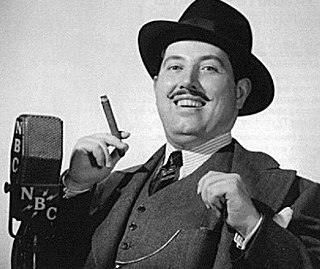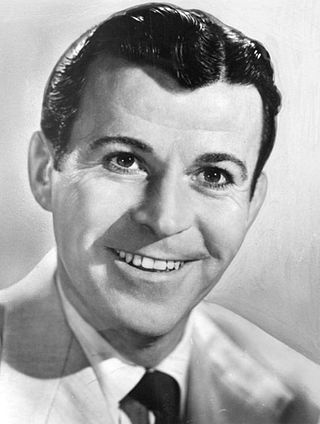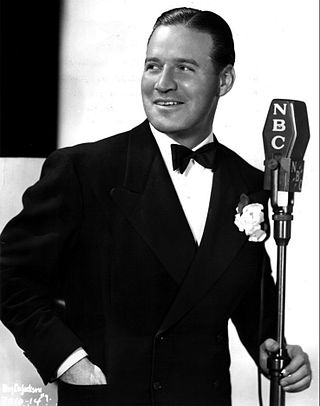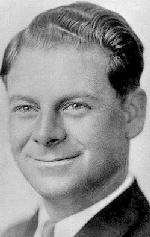Texaco Star Theater is an American comedy-variety show, broadcast on radio from 1938 to 1949 and telecast from 1948 to 1956. It was one of the first successful examples of American television broadcasting, remembered as the show that gave Milton Berle the nickname "Mr. Television".

The Great Gildersleeve is a radio situation comedy broadcast in the United States from August 31, 1941 to 1958. Initially written by Leonard Lewis Levinson, it was one of broadcast history's earliest spin-off programs. The series was built around Throckmorton P. Gildersleeve, a regular character from the radio situation comedy Fibber McGee and Molly. The character was introduced in the October 3, 1939, episode of that series. Actor Harold Peary had played a similarly named character, Dr. Gildersleeve, on earlier episodes. The Great Gildersleeve enjoyed its greatest popularity in the 1940s. Peary played the character during its transition from the parent show into the spin-off and later in four feature films released at the height of the show's popularity.
The Alan Young Show is an American radio and television series presented in diverse formats over a nine-year period and starring English-born comedian Alan Young.

Portia Faces Life was an American soap opera first broadcast as a radio series from 1940 to 1953, and then on television for a single season in the mid-1950s. It began in syndication on April 1, 1940 and was broadcast on some stations that carried NBC programs, although it does not seem to have been an official part of that network's programming. The original title was Portia Blake Faces Life.

The Jack Benny Program, starring Jack Benny, is a radio and television comedy series. The show ran for over three decades, from 1932 to 1955 on radio, and from 1950 to 1965 on television. It won numerous awards, including the 1959 Emmy for Best Comedy Show, and is generally regarded as a high-water mark in 20th-century American comedy.

The Aldrich Family, a popular radio teenage situation comedy, was also presented in films, television and comic books. In the radio series' opening exchange, awkward teen Henry's mother called, "Hen-reeeeeeeeeeeee! Hen-ree Al-drich!", and he responded with a breaking adolescent voice, "Com-ing, Mother!"

The Blue Network was the on-air name of a now defunct American radio network, which broadcast from 1927 through 1945.

Dennis Day was an American actor, comedian and singer. He was of Irish descent.

Horace Heidt was an American pianist, big band leader, and radio and television personality. His band, Horace Heidt and his Musical Knights, toured vaudeville and performed on radio and television during the 1930s and 1940s.
The Guiding Light (TGL) was an American radio series which became a television soap opera.

Young Doctor Malone is an American soap opera, created by Irna Phillips, which had a long run on radio and television from 1939 to 1963. The producer was Betty Corday (1912–1987), who also produced Pepper Young's Family and later was a co-creator with husband Ted Corday of NBC Daytime's Days of Our Lives.

Albert Pearce was an American comedian, singer and banjo player who was a popular personality on several radio networks from 1928 to 1947.

Blondie is a radio situation comedy adapted from the long-running Blondie comic strip by Chic Young. It stars Arthur Lake as Dagwood Bumstead and, for the majority of its run, Penny Singleton as Blondie Bumstead. The radio program ran on several networks from 1939 to 1950.

Nick Carter, Master Detective was a Mutual radio crime drama based on tales of the fictional private detective Nick Carter from Street & Smith's dime novels and pulp magazines. Nick Carter first came to radio as The Return of Nick Carter, a reference to the character's pulp origins, but the title was soon changed to Nick Carter, Master Detective. A veteran radio dramatist, Ferrin Fraser, wrote many of the scripts.

Donald Woods was a Canadian-American film and television actor whose career in Hollywood spanned six decades.

The Frank Sinatra Show was a title applied—in some cases specifically and in other cases generically—to several radio musical programs in the United States, some of which had other distinct titles as indicated below. Singer Frank Sinatra starred in the programs, some of which were broadcast on CBS, while others were on NBC.
Kitty Foyle is an American old-time radio and television soap opera originally aired during the 1940s and 1950s that was based on the 1940 film of the same name starring Ginger Rogers. Kitty Foyle was created by soap opera mogul Irna Phillips of Guiding Light fame and produced by daytime radio monarchs Frank and Anne Hummert of Helen Trent recognition. The program originally starred Julie Stevens in the title role of Kitty Foyle on radio. On television, the title role was portrayed by Kathleen Murray.
Valiant Lady is an American radio soap opera that was broadcast on ABC, CBS, and NBC at various times from March 7, 1938, through August 23, 1946, and later between October 8, 1951, and February 19, 1952.
The Parker Family was an American radio soap opera broadcast from 1939 to 1944.













